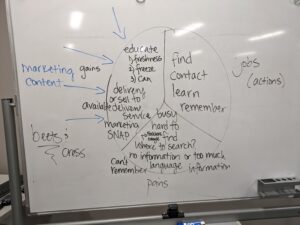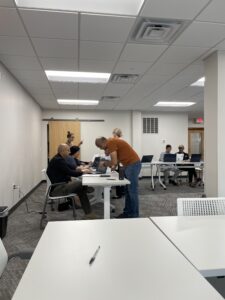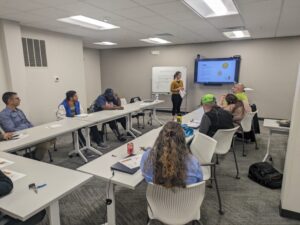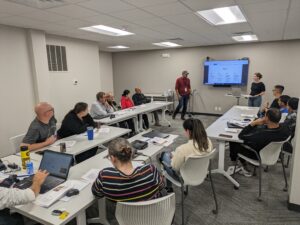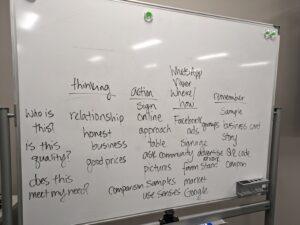Final report for LNC22-461
Project Information
Successful operation of small-scale specialty crop farms requires knowledge in production as well as business and marketing. Without foundational business skills, an otherwise successful farmer will not maximize their sales and growth potential. Community Crops works primarily with new American farmers who are often highly skilled in production but need more support on the business and marketing aspects of their operations. Barriers in culture and language can make these challenges more pronounced. Access to technology and knowledge on how to use technological tools has also been a limitation. This project, titled “Marketing & Business Skills for Beginning, Refugee, & Immigrant Farmers in Lincoln, Nebraska,” focused on providing a series of educational workshops that connected beginning and new American farmers, in the Lincoln, Nebraska area to a network of qualified instructors.
This project offered farmer education about topics related to marketing, making small farms profitable, and developing sustainable business models. 12 unique educational workshops on business and marketing related topics for small-scale specialty crop farmers in the Lincoln, Nebraska region were offered over the course of the project, with two sessions of classes held over the course of the project that increased the confidence and knowledge of small-scale specialty crop farmers in Lincoln, Nebraska region on business planning and marketing for their farm businesses. This project also developed an educational curriculum that is available to be shared with other organizations serving similar communities in our region, ensuring farmers have access to the full toolbox of skills they need to build sustainable farm operations. Our educational model included partnering with successful local farmers and community experts to co-teach so that farmers are learning from their peers and building a long-term network of relationships that can be sustained beyond the project. Farmers that signed up for the full series were provided with laptops that became their own to use for their farm business if they graduated.
Overall, we found that class content and format was effective in improving knowlege on all topics. Based on pre and post survey data, we saw improvement in self reported attitudes and knowledge per class for all farmers who completed pre and post surveys. All farmers who completed post surveys reported intent to adopt practices covered in classes. We had 29 graduate farmers in total from the two series, and 48 total farmers who attended classes.
While many farmers who took these classes are still working on growing and developing their businesses, we wanted to highlight one story in particular. One farmer, a new American farmer who is in their second year of production and graduated from the first class series, has gone on to establish his own LLC. We were also able to help this farmer apply to be a vendor at one of the local markets in town. They were accepted into the market and have been vending independently at this market during the 2025 season! This farmer is also pursuing steps to be able to sell value added products, specifically culturally important fermented goods, using their produce. We are also helping one other farmer that graduated from the first year of the series pursue a farm number application in order to access NRCS programs and resources.
Objectives:
- Offer 12 workshops ( 2 years with 6 classes each) on business planning & marketing for small-scale speciality crop farmers in the Lincoln, Nebraska region.
- Increase confidence and knowledge of small-scale specialty crop farmers in Lincoln, Nebraska region on business planning & marketing for their farm businesses.
While our objectives did not change, we were able to offer more than the 12 workshops originally planned, effectively running a second modified series with a no cost extension through 2025. In total we ended up offering 20 classes between the two class sessions. Pre- and post-surveys were utilized to understand the baseline knowledge, confidence, and educational needs of the farmers for each course. The curriculum developed, including translated materials and lesson plans, is available to other farmers and programs in the North Central Region.
This project coordinated learning targeted toward New American and Beginning Farmers on business and marketing topics for small scale specialty crop farmers. We hosted 12 workshops in the first year with 14 graduating students and 8 workshops in the second year with 15 graduating students. Lesson plans and slide decks are available for 7 of the 12 classes. The classes that lesson plans and slidedecks are not available for are those that should be taught by experts in those fields or where the best practice is for the farmer to work with a professional, versus trying to accomplish the task all on their own.
Research
Education
For this project, we utilized lecture style classes to present on all class topics. This was mainly due to the nature of the topics themselves, and many classes had suggested ‘homework’ to help keep farmers on track and engaged during the series and beyond. Due to having mixed audiences (New American & born in US) with varying language skills and primary languages, we collaborated mostly with instructors who were well versed in working with New American and ELL audiences, and are experts in their field.
2 of our classes offered were specifically created for new American audiences. These were Computer Fundamentals, a course focused on foundational computer skills like searching the internet and online ordering, sending emails, making invoices, and an introduction to using spreadsheets. Through this project we were also able to provide all farmer students with laptops, so our computer fundamentals class also provided core learning in order to help our farmers understand how to use and operate the laptops. For this class, we partnered with a local non-profit who teaches computer literacy courses and worked together to modify the class with examples and exercises relevant to farmers.
We also worked with Nebraska department of Agriculture Food Safety team member to offer an introductory Produce Safety course for English language learners, which explained FSMA and produce safety training in a modified and more accessible way than traditional training programs. Current produce safety courses are generally not set up to teach non-English speakers, especially in languages that are not Spanish, and we were able to take what we learned from this class and expand on our course materials and development for future sessions. Our current produce safety module is reflected in the attached curriculum.
In our second year of the project, we repeated 7 of the 12 topics, with one new course added, Insurance for Small Scale Farmers. The second cohort was made up of all new students. We chose not to offer all 12 classes from the first session because after reflection and assessment, it became clear that the best advice for farmers for some topics was for the farmers in our target audience to work with a professional for things such as taxes, insurance, and graphic design.
All classes were offered in English and Arabic, and slide decks for classes are available in both languages. For class content and curriculum guidance on general business and marketing topics, we partnered with an established outside instructor and local organization that works to teach in depth business courses for new Americans, and for classes on more farm business specific topics, we partnered with a local farmer for advice on content and instruction. We were also able to bring in with local NRCS officers to offer a session about NRCS and USDA programs for farmers and how to access them. Slide-decks were printed as handouts for most classes based on the approach and advice from instructors. The full curriculum is currently available an informational product through this report. It contains lesson plans, handouts and public view links to all presentations and any relevant handouts.
Project Activities
Educational & Outreach Activities
Participation summary:
In total, we hosted 20 workshops, described in detail in the ‘Project Activities section’. Our outreach included heavy recruiting for farmers who grow at our two farm sites to participate in the classes, in our monthly newsletter and social media promotion, and with individuals working in local food and sustainable agriculture who are serving on the leadership team as part of a UAIP grant we have active. Additionally, we presented on this project as part of the Nebraska Healthy Farms Local Food conference in January 2024. Noting that for the 29 educational products listed above, we are counting each individual component of the curriculum separately.
Learning Outcomes
Project Outcomes
Improved computer literacy and comfortability using computers for business purposes, including invoice creation and sending emails
Improved agricultural practices that support produce safety standards or reported intent to implement new practices
Pursuing farm number application with intent to access USDA/NRCS programs and resources
Reported improved understanding of finance management best practices and intent to adopt
Reported improved understanding of marketing and brand identity, with some individuals choosing trade names and/or working to create logo for farm business
Reported improved understanding of reasons and steps to write a business plan
Reported improved understanding of business legal structures, with some individuals transitioning their farm from Sole Proprietorship to LLC during the span of this project
Reported improved understanding of US tax structure and tax requirements
Created production plan or reported improved understanding on how to do so
Reported improved understanding of farm recordkeeping and/or intent to improve recordkeeping practices
While our biggest success story is one of our graduate farmers establishing his farm as an LLC, pursuing farmers market sales independently of the Crops program, and working to be able to sell value added fermented products in addition to fresh vegetable sales, we were provided several comments from students from our post surveys that we also wanted to share in this section, quoted below.
- 'Thanks for this new information about food safety, before this class I knew very little on this subject."
- 'Thank you for the opportunity, it is great to learn more about computer. Thank you for all the help since 2019 and helping us involving to the marketing, community, and real produce of Nebraska land, we love to learn and grow food!"
- "We learned very valuable topics about registering business!"
- "I understand a business plan at a fundamental level now."
Attached also are several photos from our classes.
